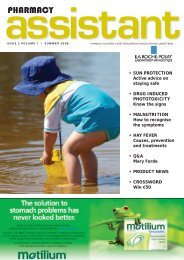veNTIlATIoN - Green Cross Publishing
veNTIlATIoN - Green Cross Publishing
veNTIlATIoN - Green Cross Publishing
You also want an ePaper? Increase the reach of your titles
YUMPU automatically turns print PDFs into web optimized ePapers that Google loves.
Abbreviated Prescribing Information<br />
Victoza ® 6 mg/ml solution for injection in pre-filled pen (liraglutide). Please refer<br />
to the Summary of Product Characteristics for full information. Victoza ® 2 x 3 ml<br />
pre-filled pens. Victoza ® 3 x 3 ml pre-filled pens. 1 ml of solution contains 6 mg<br />
of liraglutide. Indication: Treatment of adults with type 2 diabetes mellitus in<br />
combination with metformin or a sulphonylurea, in patients with insufficient<br />
glycaemic control despite maximal tolerated dose of metformin or sulphonylurea<br />
monotherapy; or in combination with metformin and a sulphonylurea, or<br />
metformin and a thiazolidinedione in patients with insufficient glycaemic control<br />
despite dual therapy. Dosage: Victoza ® is administered once daily by<br />
subcutaneous injection and can be administered at any time independent of<br />
meals however, it is preferable that Victoza ® is injected around the same time<br />
of the day. Victoza ® should not be administered intravenously or intramuscularly.<br />
Recommended starting dose is 0.6 mg daily. After at least one week, the dose<br />
should be increased to a maintenance dose of 1.2 mg. Based on clinical<br />
response, after at least one week the dose can be increased to 1.8 mg to further<br />
improve glycaemic control in some patients. Daily doses higher than 1.8 mg are<br />
not recommended. When used with existing metformin therapy or in combination<br />
with metformin and thiazolidinedione therapy, the current dose of metformin<br />
and thiazolidinedione can continue unchanged. When added to existing<br />
sulphonylurea therapy or in combination with metformin and sulphonylureas, a<br />
reduction in the dose of sulphonylurea may be necessary to reduce the risk of<br />
hypoglycaemia. Victoza ® can be used in the elderly (>65 years old) without dose<br />
adjustment but therapeutic experience in patients ≥75 years of age is limited.<br />
No dose adjustment is required for patients with mild renal impairment<br />
(creatinine clearance ≤60-90 ml/min). Due to lack of therapeutic experience<br />
Victoza ® is not to be recommended for use in patients with moderate (creatinine<br />
clearance of 30-59 ml/min) and severe renal impairment (creatinine clearance<br />
below 30 ml/min), patients with end stage renal disease, patients with hepatic<br />
impairment and children below 18 years of age. Contraindications:<br />
Once-daily Victoza ® (liraglutide), in combination with metformin,<br />
impacts on multiple factors associated with type 2 diabetes<br />
providing, from baseline: 1,2<br />
Reductions in HbA1c: up to 1.30% 1,2<br />
Reductions in weight: up to 2.8kg 1,2<br />
Reductions in systolic blood pressure 1,2<br />
Improvements in beta-cell function 1,2<br />
Hypersensitivity to the active substance or any of the excipients. Warnings and<br />
Precautions for use: Victoza ® should not be used in patients with type 1<br />
diabetes mellitus or for the treatment of diabetic ketoacidosis. Limited experience<br />
in patients with congestive heart failure New York Heart Association (NYHA)<br />
class I-II and no experience in patients with NYHA class III-IV. Due to limited<br />
experience Victoza ® is not recommended for patients with inflammatory bowel<br />
disease and diabetic gastroparesis. Victoza ® is associated with transient<br />
gastrointestinal adverse reactions, including nausea, vomiting and diarrhoea.<br />
Other GLP-1 analogues have been associated with pancreatitis; patients should<br />
be informed of symptoms of acute pancreatitis: persistent, severe abdominal<br />
pain. If pancreatitis suspected, Victoza ® and other suspect medicinal products<br />
should be discontinued. Thyroid adverse events, including increased blood<br />
calcitonin, goitre and thyroid neoplasm reported in clinical trials particularly in<br />
patients with pre-existing thyroid disease. Risk of hypoglycaemia in combination<br />
with sulphonylureas; lowered by dose reduction of sulphonylurea. No studies on<br />
the effects on the ability to drive and use machines performed. Patients should<br />
be advised to take precautions to avoid hypoglycaemia while driving and using<br />
machines, in particular when Victoza ® is used in combination with a<br />
sulphonylurea. Substances added to Victoza ® may cause degradation; in the<br />
absence of compatibility studies Victoza ® must not be mixed with other medicinal<br />
products. Pregnancy and lactation: Victoza ® should not be used during<br />
pregnancy or during breast-feeding. If a patient wishes to become pregnant, or<br />
pregnancy occurs, treatment with Victoza ® should be discontinued; use of insulin<br />
is recommended instead. Undesirable effects: During clinical trials with<br />
Victoza ® the most frequently observed adverse reactions which varied according<br />
to the combination used (sulphonylurea, metformin or a thiazolidinedione) were:<br />
Very common: nausea, diarrhoea, hypoglycaemia when used in combination with<br />
metformin and a sulphonylurea and headache when used in combination with<br />
metformin; Common: hypoglycaemia when used in combination with a<br />
thiazolidinedione, vomiting, constipation, abdominal pain, discomfort and<br />
References: 1. Victoza ® Summary of Product Characteristics, July 2009.<br />
2. Nauck M et al; for the LEAD-2 Study Group. Efficacy and safety comparison of liraglutide, glimepiride, and placebo, all in combination with metformin,<br />
in type 2 diabetes: the LEAD (liraglutide effect and action in diabetes)-2 study. Diabetes Care 2009;32(1):84-90.<br />
Victoza ® is a trademark owned by Novo Nordisk A/S.<br />
Date of preparation: July 2009. IR/LR/0709/0268<br />
distension, dyspepsia, gastritis, flatulence, gastroesophageal reflux disease,<br />
gastroenteritis viral, toothache, headache, dizziness, nasopharyngitis, bronchitis,<br />
anorexia, appetite decreased, fatigue and pyrexia. Gastrointestinal adverse<br />
reactions are more frequent at start of therapy but are usually transient. Very<br />
few hypoglycaemic episodes observed other than with sulphonylureas. Patients<br />
>70 years or with mild renal impairment (creatinine clearance ≤ 60-90 ml/min)<br />
may experience more gastrointestinal effects. Consistent with medicinal products<br />
containing proteins/peptides, patients may develop anti-liraglutide antibodies<br />
following treatment but this has not been associated with reduced efficacy of<br />
Victoza ® . Few cases reported of angioedema (0.05%), acute pancreatitis<br />
(










